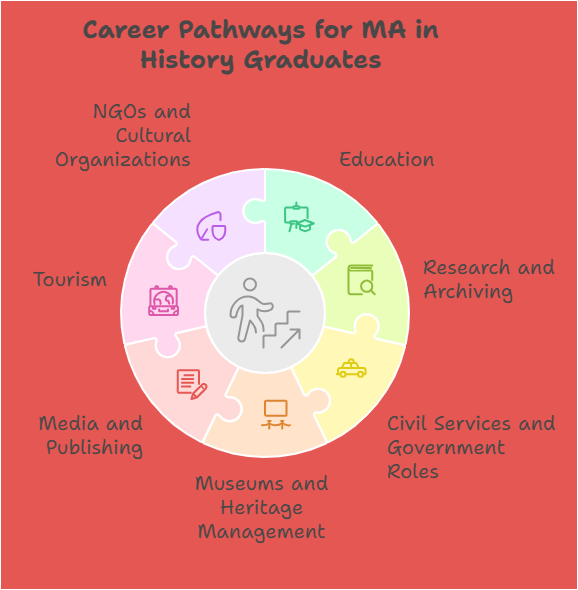A Master of Arts (MA) in History is an ideal choice for those who are passionate about exploring the past and understanding its impact on the present and future. This program offers a comprehensive study of historical events, societies, cultures, and economies, providing graduates with a deep knowledge base and analytical skills.

Let’s explore the scope of an MA in History and the exciting career opportunities it brings.
MA History Syllabus Overview
The syllabus covers a broad range of topics to develop a strong foundation in historical analysis. While specifics may vary across institutions, here are common subjects:
| Core Subjects | Electives and Specialisations |
|---|---|
| History of Punjab (1469-1799) | Indian Art and Architecture |
| History of Ancient India from Earliest Times to the Gupta Empire | History of World (1400-1870 A.D.) |
| Institutions of Ancient India | History of the Mughals from 1526 - 1605 |
| World HistorySultanate Period (1000-1526) | National Movement in India and Constitutional Development (1858-) |
| >History of the Mughal Empire and its Downfall (1605-1707 A.D.) | Study of Medieval Institutions: Social Culture & Economics |
The syllabus is designed to cultivate critical thinking, research abilities, and in-depth knowledge of historical contexts.
Scope of an MA in History

The scope of careers after this degree gets better, offering roles across various fields. The program equips graduates with analytical, writing, and research skills that are highly valued in multiple professions. Here are some areas where graduates of this degree can thrive:
-
Education
- Lecturer/Professor in universities and colleges
- A history teacher in schools
- Curriculum developer for educational institutions
-
Research and Archiving
- Historical researcher
- Archivists in museums, libraries, and government institutions
- Research assistant for academic or non-academic projects
-
Civil Services and Government Roles
- Indian Administrative Services (IAS), Indian Foreign Services (IFS), and other competitive
- Roles in public administration and policymaking
-
Museums and Heritage Management
- Museum curator or guide
- Heritage site manager
- Conservation and restoration specialist
-
Media and Publishing
- History content writer
- Author of historical books
- Editor for magazines, journals, and documentaries
-
Tourism
- Historical tour guide
- Travel consultant specialising in heritage tourism
-
NGOs and Cultural Organizations
- Roles in organisations promoting cultural preservation
- Advocacy for historical conservation initiatives
Why Choose MA History?
- Specialisation: Allows deeper exploration of topics like cultural history, gender studies, and environmental history.
- Career Diversity: Prepares graduates for jobs in education, government, media, and heritage management.
- Higher Studies: Acts as a foundation for pursuing a Ph.D. or other research-based programs.
Conclusion
An MA in History provides a gateway to fulfilling careers in education, research, administration, and cultural preservation. If you have a passion for history, this degree will help you shape a rewarding and impactful career.
This program is ideal for individuals seeking to make a meaningful contribution to society by connecting the past to the present. Whether pursued on-campus or through an MA History online mode, this degree opens diverse career avenues in education, research, heritage management, and beyond.
